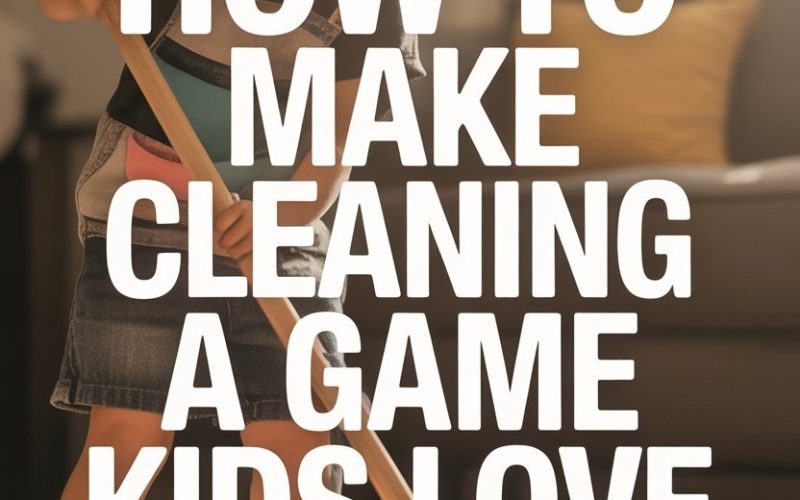Any parent who’s ever uttered “Could you please tidy your room?” knows the look: part horror, part confusion, 100% resistance.
Yet, while most children would rather eat week-old broccoli than pick up their blocks, there’s a way to turn this daily standoff into something the whole family actually enjoys.
Why Kids Resist Cleaning
Children aren’t born with an innate love of cleaning. Expecting them to leap at the opportunity to scrub the loo is, well, optimistic.
Researchers say that kids need incentives and purpose to engage in chores—especially when “fun” activities are always one screen tap away.
To win them over, the trick is simple: Make it feel less like work and more like play.
Imagination is Your Best Cleaning Tool
Remember when a sheet became a superhero cape or a cardboard box turned into a rocket ship? That same imagination can be a parent’s secret weapon.
Turn dusting into a “wizard duel” against the Dust Bunnies of Doom. The vacuum? That’s now a monster-eating machine and the crumbs are its dinner.
If you’ve ever seen your child chase imaginary dragons for half an hour, you know their commitment to a story is ironclad.
The more you lean in, the more they will. Silly voices and sound effects encouraged.
Create Simple, Silly Challenges
Timing is everything. A race to see who can put away more blocks before the song ends turns tidying into a pulse-pounding event.
Not only does this technique bring out their inner competitor, but it also harnesses their natural love of speed—without the need for actual running shoes.
Try these crowd-pleasers:
- “Can you get all the Lego in the bucket before the timer beeps?”
- “Let’s see how many socks you can match in one minute.”
- “Every time you find a toy car, make a vroom sound.”
Keep the challenges short and sweet. Even the most stubborn cleaner can handle two minutes of high-stakes laundry folding.
Music Makes Everything Better
There’s a reason Mary Poppins swore by a “spoonful of sugar.” A playlist of boppy, upbeat tunes turns cleaning into a dance party.
Let your child pick the songs. When their favorite tune comes on, the energy lifts, motivation spikes, and suddenly, tidying feels like a celebration.
If you’re brave, choreograph a “sweeping dance” or belt out a cleaning anthem. (No one’s watching. Unless you accidentally go viral—then, you’re welcome.)
Some parents even let kids pause to dance between tasks. Motivation and mini exercise, all in one.
Level Up with Points and Rewards
Gamification isn’t just for screen time. Assign points for each task—say, one point per shirt folded or five points for every book shelved. Tally them on a whiteboard or a sticky note.
Bigger tasks unlock “bonuses.” Maybe three full baskets earn an extra bedtime story, or a clean bathroom means they get to pick dessert.
Psychologists agree that small, immediate rewards work wonders for younger children, while older kids enjoy saving up points for larger treats.
Not every prize has to be tangible. Sometimes, it’s just the thrill of “winning” against Mum or Dad.
Use Cleaning-Themed Toys and Tools
A pink feather duster, a mop with googly eyes, a tiny vacuum shaped like a robot—these gadgets are worth their weight in gold. When a tool looks more like a toy than an appliance, kids want to use it.
For very little ones, toy versions of cleaning tools can help them mimic the grown-ups and feel important. (Just don’t expect miracles from a plastic broom.)
For school-age kids, real but child-sized tools give them a sense of power and responsibility. No one likes wrestling a mop twice their size.
Turn Cleaning into a Team Sport
One-on-one cleaning can feel like a punishment. Cleaning as a team? Suddenly you’re all in it together.
Assign roles: The “Sock Seeker,” the “Book Boss,” the “Pillow Fluffer.” Rotate jobs each time, so no one gets stuck as the dustpan carrier for eternity.
Working together not only speeds things up but fosters a sense of family pride. According to psychology experts, kids who pitch in feel more capable and connected.
Teasing helps, too. “Mum’s on the prowl for stray dinosaurs! Hide them before she finds them!” Watch the room empty itself in record time.
Make It Visual and Track Progress
Sticker charts, colourful checklists, and visual timers are more than cute—they’re powerful motivators.
Younger children especially love seeing their progress. Each sticker or tick is a mini-celebration of effort. Visual cues also break down big jobs into bite-sized, less intimidating tasks.
Apps can do this, too. Simple chore apps like OurHome or ChoreMonster turn tidying into a quest, complete with levels and monsters to defeat. If your child loves screens, these can offer just the right nudge.
Bring in Friendly Competition
Sibling rivalry can be a pain—unless you direct it toward your benefit. Set up a little competition: “Who can put away more clothes—the older sister or the little brother?” Or, “Can you both beat Mum’s time?”
Keep it light and positive. The goal isn’t to create tension, but to add a spark of excitement. Sometimes, the only thing more motivating than a sticker is beating your older brother’s record.
If you’re a single-child household, compete against “yesterday’s best score,” or set a family record to break together.
Storytelling While Cleaning
Cleaning gets a reputation for being mindless, but it’s the perfect time for stories. Make up an adventure as you go: “The lost kingdom of Under-the-Bed,” or “The Mystery of the Missing Sock.”
Children can narrate their actions (“Now, the brave knight rescues the teddy bear from the dragon closet!”) or make up wild reasons why the couch cushions multiplied overnight.
This mental side trip turns a dull task into a memory they’ll want to repeat—and gives parents a creative outlet, too.
Give Choices and a Sense of Control
Nobody (adult or child) likes feeling bossed around. Offer options: “Would you like to wash the table or sweep the floor?” “Should we start in the lounge or your bedroom?”
Simple choices give kids a sense of control and make them more likely to cooperate. According to a study in Penn State University, autonomy increases motivation far more than any amount of nagging.
Asking for their help planning the “game” adds even more buy-in. They may surprise you with their own creative ideas—you might find yourself racing dust bunnies with a spatula.
Break Big Tasks into Mini-Games
The idea of cleaning an entire room can send kids running for the hills. Shrink the job down: “Let’s see how many red blocks we can find.” “Can you find five things that don’t belong?”
Divide the room into “zones” and tackle each with a new game or challenge. Maybe the toy box is a treasure chest, and every found item is loot.
Short, focused bursts help children stay engaged, and before they know it, the room is tidy—without tears (yours or theirs).
Model Enthusiasm (or at Least Fake It Convincingly)
Children are expert mood detectives. If you approach cleaning with a groan and an eye roll, they’ll pick up on it. Channel your inner children’s TV presenter—even if you’re only pretending.
Make a big deal out of small victories. “Wow, you found all the missing puzzle pieces!” “This bookshelf looks amazing now!”
Eventually, you might even convince yourself that folding socks is a festival.
Relax the Rules and Embrace Imperfection
Here’s where every perfectionist parent needs a deep breath. When kids are involved, the T-shirt pile won’t be military neat, and the windows may still have fingerprints.
The goal is participation and pride, not a showroom finish. Celebrate effort, not results. Trust that with time, their skills will grow (and the fingerprints will fade—until the next snack time).
Set a Regular Cleaning Game Time
Routines work wonders. Consistency cues their brains that this is just what your family does. Maybe it’s a 10-minute “clean-up boogie” every evening, or one big “Saturday blitz.”
Predictability lowers resistance and makes cleaning feel as normal as brushing teeth or putting on shoes.
When everyone knows what to expect, tantrums mellow, and the job gets done before anyone has time to whinge.
Ask for Feedback and Keep It Fresh
A game that worked last month might flop today. Kids outgrow games quickly, so mix it up. Ask what they liked best, or what new twist they’d try next time.
Maybe it’s time to invent a new superhero cleaner, or swap the reward from stickers to choosing the next night’s dinner. Flexibility keeps things fun and prevents eye rolls from teenagers (well, you can hope).
A Cleaner House and Happier Kids—Yes, Both
Turning cleaning into a game doesn’t just fill your Instagram grid with adorable moments.
According to raisingchildren.net.au, children who help out at home build confidence, responsibility, and a sense of belonging. Parents benefit, too, with less yelling, more laughs, and—miracle of miracles—a tidier house.
Next time your child groans at the sight of the laundry basket, summon your best game show host voice. Pick a silly challenge or invent a ludicrous story. You might just discover that cleaning time becomes a highlight, not a headache.
Tonight, grab a duster, crank up the tunes, and see what kind of fun your family can create—together.





